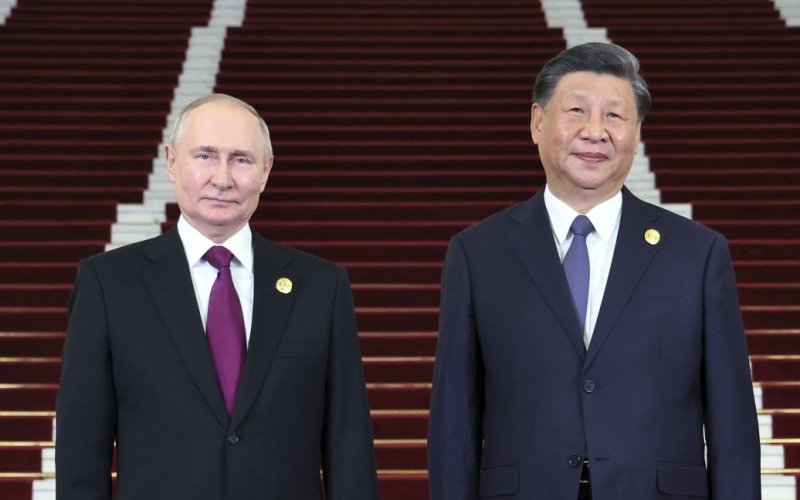
Xi is trying to strike a delicate balance – he wants to maintain an alliance with Putin, realizing that close ties with the exile threaten his stable ties with the West.
Vladimir Putin's state visit to China this week was a show of force. This was a chance for the Kremlin dictator to prove to the world that he has a powerful ally on his side.
BBC writes about this.
This is no longer a “partnership without restrictions”
Putin is widely considered an exile after he ordered the invasion of Ukraine. But for Chinese President Xi Jinping, he is a key partner in the search for a new world order that will not be led by the United States.
Yi Xi greeted his guest. He rolled out the red carpet, a band played old Red Army songs, and joyful children greeted both leaders as they strolled through Tiananmen Square. There was even a short hug in front of the cameras.
Russian and Chinese state media focused on the friendly relationship between the two leaders. But in reality, this is no longer a partnership without restrictions.
How Putin pleases Xi
Putin came to China with his hat in hand, eager for Beijing to continue trading with an isolated Russia under tough sanctions. His statements were full of honeyed tones and flattering phrases.
He said his family was learning Chinese, which was especially noteworthy since he rarely talks about his children in public. He said he and Xi were “close as brothers” and went on to praise China's economy, saying it was “developing in leaps and bounds at a rapid pace.” This will likely play well into the hands of Beijing officials concerned about the sluggish economy.
Reaction of the Chinese leader
But Xi himself did not support the tone of these lofty compliments. His remarks were more superficial—even mild. Putin, he said, was “a good friend and a good neighbor.” For China, a welcoming ceremony and show of unity is in its interest, but doling out praise to a guest is not.
The costly war in Ukraine, which shows no signs of ending, has changed their relationship, exposing weaknesses in the Russian military and economy. Xi will know that he is now in charge. The war isolated Russia. China's ties with the West may be strained, but Beijing has not cut itself off from the world like Russia and does not want to do so.
While public statements may have lacked enthusiasm, President Xi has hinted at the importance China places on the relationship. He invited Putin to his official residence, Zhongnanhai. Few leaders have been so honored—US President Barack Obama was among them in 2014, when ties between the two countries were at their best.
Xi is trying to strike a delicate balance – he wants to maintain an alliance with Putin, realizing that close ties with the exile threaten his stable ties with the West, which he needs to help the ailing economy.
What the visit was really about
The thing is, this visit was about money: Putin needs China's support in his war in Ukraine. The composition of the Russian leader's cordon indicates what he hoped to gain from this trip: he brought with him the head of the Russian Central Bank, the Minister of Finance and his economic adviser.
The joint statement released to mark the visit also contained several attractive ideas to boost trade – building a port on an island the two countries once fought over for more than 100 years, and talks with North Korea to see if Chinese ships could pass through the key river of the Sea of Japan.
The word “collaboration” is mentioned 130 times.
All this, of course, will be closely watched by the United States. Last month, US Secretary of State Antony Blinken warned China to stop fueling Russia's war and trading components that could be used in Russian drones and tanks.
So they didn't miss the fact that during Friday's visit to Harbin, Putin visited a state university known for its cutting-edge defense research.
This visit—and the ceremony and symbolism surrounding it—certainly suggests that Xi is determined to prove that he will not come under pressure from the West. But behind the scenes of this show of unity, there may be limits to how far Xi is willing to go.
In the end, China's interests are not Russia's interests. As the senior partner in this relationship, Xi is likely to cooperate when it suits him—even if his “every friend” and ally needs him.
Recall, Russian President-dictator Vladimir Putin said that the basis for negotiations with Ukraine is the Istanbul agreements, which took place in the spring of 2022, after the start of a full-scale invasion.
Related topics:
More news

